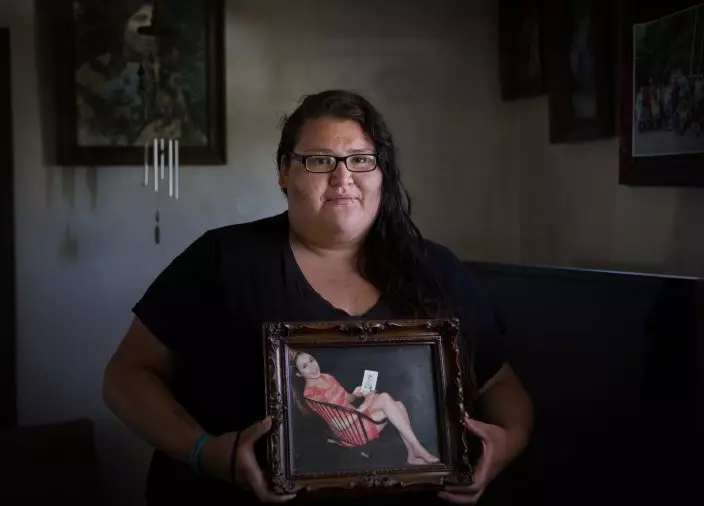The sister of a missing Blackfeet woman in Montana expressed frustration Wednesday over law enforcement's initial response to her loved one's disappearance, telling U.S. senators that numerous Native American families are troubled by inadequate investigations into their missing persons cases.
The prepared testimony from Kimberly Loring was part of a hearing held by the U.S. Senate Committee on Indian Affairs in Washington to examine what authorities call a "silent crisis" — the deaths and disappearance of hundreds of Native American women.
Sen. Tom Udall, a Democrat from New Mexico, said factors compounding the crisis include poor coordination among the multiple law enforcement agencies tasked with investigating crimes on Indian reservations. He and other senators also shared concerns over a lack of government data to measure the scope of a problem that has gained attention following the #MeToo movement, as well as years of legislative efforts to address the high rates of violence against Native American women.

File - In this July 13, 2018, file photo, Kimberly Loring holds a photo of her sister, Ashley HeavyRunner Loring, who went missing on the Blackfeet Indian Reservation as she stands in her grandmother's home in Browning, Mont. Loring, the sister of a missing Blackfeet woman in Montana is expressing frustration over police's initial response to her loved one's disappearance, telling U.S. senators in prepared testimony Wednesday, Dec. 12, 2018, that "dysfunctional" investigations into missing persons cases have troubled numerous Native American families. (AP PhotoDavid Goldman, File)
"The loss is horrific," said John Barrasso, a Republican from Wyoming. "That they are not represented in the data is also horrific."
Ashley HeavyRunner Loring vanished in June 2017 at age 20, leaving her sister Kimberly Loring and others to suspect she was in danger or hurt — possibly even left in the mountains of her reservation near Glacier National Park. Loring recalled that despite these concerns, both Blackfeet tribal police and Bureau of Indian Affairs law enforcement seemed dismissive, saying two months into the search that, "Ashley is of age and can leave whenever she wants to."
Loring also was critical of the BIA's handling of evidence, saying agents failed to ensure a crime lab test was conducted on a stained sweater found early in the investigation and that witnesses believed belonged to HeavyRunner Loring.
A BIA spokeswoman did not immediately provide comment in response to Loring's concerns. The FBI early this year became the lead law enforcement agency in the case.
"I am asking you to recognize that indigenous women matter, and the way our missing and murdered women cases are handled needs to be corrected," Loring said. "We are going missing, we are being murdered. We are not being taken seriously."
An Associated Press report this year found that Native Americans and Alaska Natives, who comprise less than a percentage point of the population, made up 1.8 percent of ongoing missing cases in the FBI's National Crime Information Center database — a figure the agency's assistant director of criminal investigations cited Wednesday in prepared testimony.
Native women, who represent .4 percent of U.S. residents, accounted for more than 0.7 percent of the missing cases, or 633. Advocates say that figure likely represents an undercount.
In AP interviews earlier this year, multiple families — including HeavyRunner Loring's — described feeling disappointed or dismissed after initially taking the cases of missing female relatives to police on their reservations.
"We all share the same experience when working with law enforcement," Kimberly Loring said.
Patricia Alexander, who co-chairs a taskforce on violence against women for the Tlingit and Haida tribes in Alaska, called on lawmakers to increase funding for crime prevention, victims' services and data collection.
Charles Addington, who is the deputy director of the BIA's Office of Justice Services, acknowledged before the committee that more coordination among law enforcement agencies is needed early in police investigations to solve missing persons' cases.
He outlined a series of measures his agency has taken amid mounting concerns about missing women, starting with adding human trafficking courses for officers at the BIA-Indian Police Academy in Artesia, New Mexico.
Addington's comments came amid pointed questions from lawmakers over his agencies' handling of investigations.
"Where's the problem? Is it with the BIA? Is it with the FBI? Is it with tribal law enforcement?" asked Sen. Jon Tester, a Democrat from Montana. "Something is not happening that needs to be happening."
Associated Press national writer Sharon Cohen in Chicago contributed to this report.
Read AP's full coverage on missing Native American women: https://apnews.com/tag/MissingInIndianCountry .










